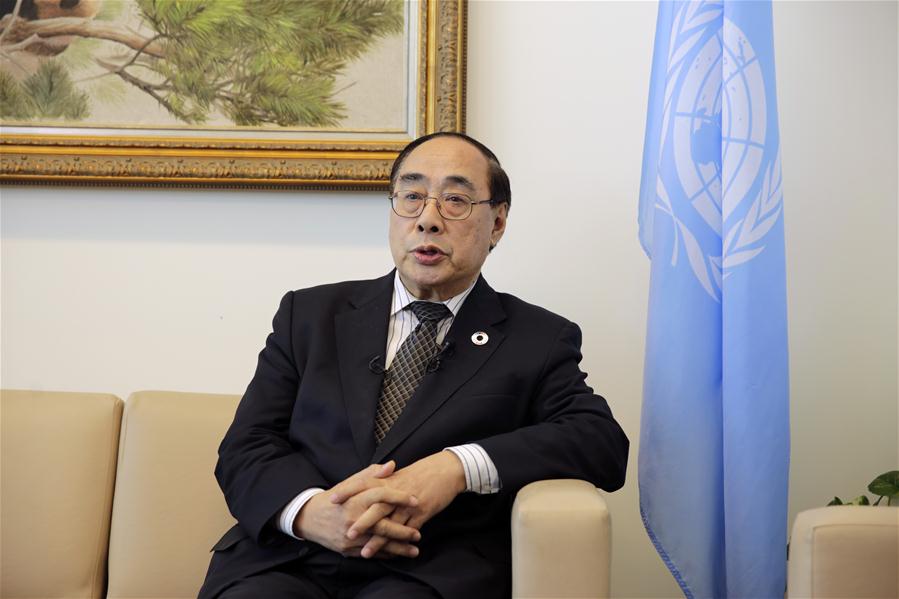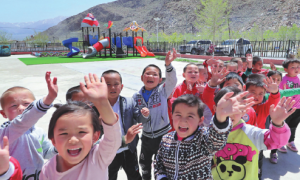UNITED NATIONS, May 4 (Xinhua) -- The upcoming high-level forum on China's Belt and Road Initiative will send a positive and important message to the world that globalization is irreversible and the win-win cooperation can inject strong impetus to the future world development, a senior UN official has said.

Wu Hongbo, UN under-secretary-general for economic and social affairs, speaks during a joint interview with Chinese media at the UN headquarters in New York, May 3, 2017. The upcoming high-level forum on China's Belt and Road Initiative will send a positive and important message to the world that globalization is irreversible and the win-win cooperation can inject strong impetus to the future world development, Wu Hongbo has said. (Xinhua/Li Muzi)
Wu Hongbo, UN under-secretary-general for economic and social affairs, told a group of UN-based Chinese news outlets in an interview that the Belt and Road Forum for International Cooperation, scheduled for May 14-15 in Beijing, will be "a great event both in China and the world this year," and it will be held against a backdrop of rising voices against globalization and for trade protectionism in some parts of the world, the western countries in particular.
While acknowledging there are pros and cons in the globalization, Wu said, "Although globalization has some problems and has room for improvement, the trend continues and develops, and win-win cooperation can help make up for problems that crop up in globalization."
The Belt and Road Initiative, put forward by China in 2013, is in line with the spirit of the UN Charter and the 2030 Agenda, he said, adding that both the UN agenda and the Chinese initiative are aimed at eradicating poverty.
The 2030 Agenda is the blueprint for global efforts to reach the Sustainable Development Goals, a set of 17 targets to be met 13 years from now.
The vision of the Belt and Road Initiative (the Silk Road Economic Belt and the 21st Century Maritime Silk Road) is essentially about connectivity -- facilitated by infrastructure, he noted, adding that it will also promote the cultural exchanges between peoples of various countries.
The Belt and Road initiative, which embodies responsibility, win-win cooperation and genuine pursuit of common development, offers the world a Chinese approach to the challenges of today; a balanced, equitable and inclusive development model.
The Chinese initiative, already put into several relevant UN resolutions over the past months, wins global recognition, he said. "This marks a milestone in China's foreign relations and it also shows the international community has high hopes for China."
On March 17, the UN Security Council adopted a resolution to renew the mandate of the UN Assistance Mission in Afghanistan (UNAMA), which also urged further efforts to implement the Belt and Road Initiative and other regional development efforts.
The council "welcomes and urges further efforts to strengthen the process of regional economic cooperation, including measures to facilitate regional connectivity, trade and transit, including through regional development initiatives such as the Silk Road Economic Belt and the 21st-Century Maritime Silk Road Initiative, and regional development projects ...," said the resolution.
The Chinese initiative has so far gained the support of more than 100 countries and international organizations, and more than 40 have signed cooperation agreements with China.
"This means the initiative and the concept have received global recognition, which is a milestone of China's foreign relations," said Wu.
Top UN officials, who took part in a recent high-level UN meeting chaired by UN Secretary-General Antonio Guterres, all agreed that the successful implementation of the Chinese initiative will have a profound effect on the geo-politics and economic development across the world, he noted.
Guterres will travel to China to attend the high-level event in Beijing, and his presence shows strong UN support for the Chinese initiative, said Wu, who will be a member of the UN delegation to the forum.
All the heads of UN agencies and programs are also expected to meet in Beijing during the forum, he said.
More than 1,200 delegates will attend the forum, including officials, scholars, entrepreneurs, representatives of financial institutions and media organizations from 110 nations, as well as representatives from more than 60 international organizations.
"This only marks a beginning," Wu said. "I am convinced that all relevant UN bodies will further back the Belt and Road Initiative, a Chinese proposal with a vision, to benefit all members of the international community."







